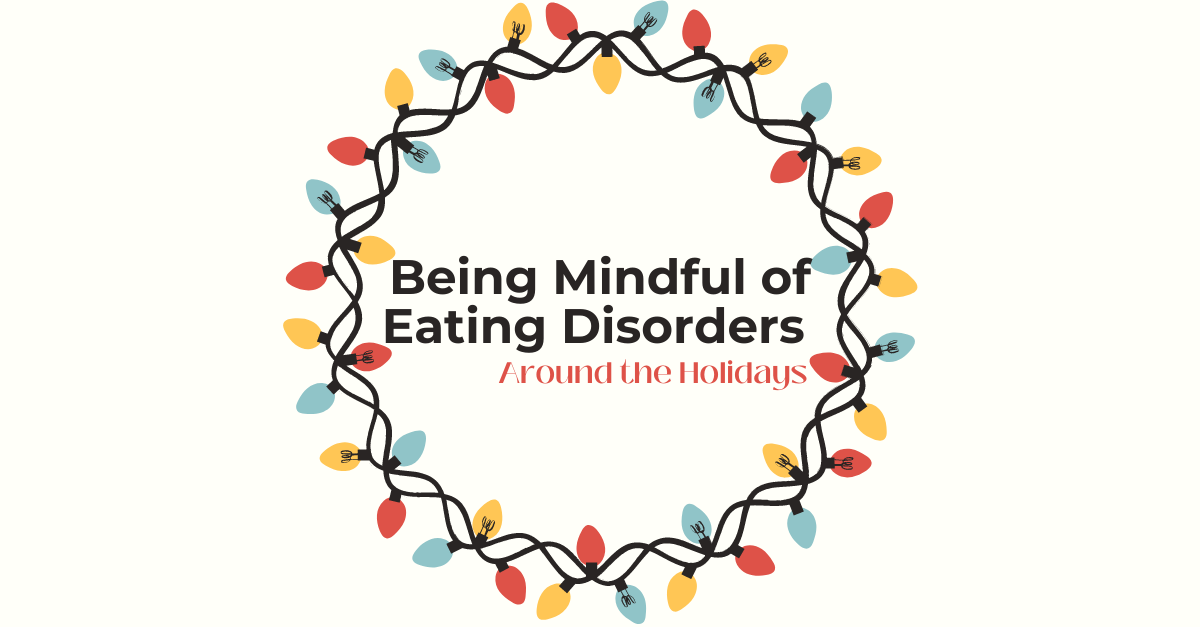Eating disorders currently impact 9% of people in the United States. While symptoms of eating disorders impact people year-round, the holiday season tends to be an especially difficult time. Holiday gatherings are usually centered around traditional foods and desserts, which many of us enjoy and look forward to. However, for your loved ones who struggle with disordered eating and body image issues, these gatherings likely bring feelings of anxiety, sadness, and stress. It is important not to assume everyone who struggles with an eating disorder feels this way about the holidays, but to be mindful of their experiences and learn how to best support them.
What are the Different Types of Eating Disorders?
To understand how to support your loved ones, it is helpful to first learn about the different types of eating disorders.
- Anorexia Nervosa: involves restricting food intake (eating less or skipping meals),weight loss leading to low body weight (in the context of their age and physical health), fear of gaining weight, and body image distortion (not seeing themselves accurately and likely thinking they are overweight when they are not)
- Bulimia Nervosa: involves recurrent episodes of binge eating followed by compensatory behaviors to prevent weight gain (self-induced vomiting, misusing laxatives/diuretics, fasting, or excessive exercise), and body image distortion
- Binge Eating Disorder: involves recurrent episodes of binge eating (eating an amount of food that is larger than what most people would eat in a similar period of time and a sense of lack of control over eating during that time), feeling distressed about binge eating episodes, and can involve eating much faster than normal, eating until uncomfortably full, eating large amounts when not physically hungry, eating alone because they’re embarrassed by the amount they’re eating, and feeling guilty after binge eating.
- Avoidant Restrictive Food Intake Disorder (ARFID): involves restrictive eating that leads to significant weight loss or nutritional deficiency, and dependence on tube feeding or nutritional supplements. Their restrictive eating may be due to sensory issues, lack of interest in food/low appetite, or fears related to choking, vomiting, or becoming sick from the food. They do not experience body image issues or fear of gaining weight.
- Unspecified Feeding or Eating Disorder: involves symptoms of any of the above eating disorders that cause significant difficulties for the person, but do not meet the full criteria for any of the specific disorders. Meaning the length of time or how often they engage in behaviors may not meet the required number, but they still experience these difficulties.

Recognizing the Signs of an Eating Disorder
While your loved one may have shared with you that they have an eating disorder, it’s also important to be aware that many people who struggle with disordered eating have not been officially diagnosed and have difficulty talking about their symptoms. That is why it can be helpful to recognize common signs of someone who struggles with an eating disorder.
Common emotional and behavioral signs include:
- Appear uncomfortable eating around others
- Skipping meals, only taking small portions of food, or dieting
- Refusing to eat certain foods/restricting whole categories of food (carbohydrates, fats, sugar)
- Preoccupied with weight, food, calories, and ingredients of dishes
- Extreme concern with body size and shape
- Eating very slowly, cutting food into small pieces, hiding food in napkins
- Concerns about sensory aspects of food (texture, smell, color, etc.)
- Fears of getting sick or choking
- Frequent checking in the mirror
- Mood swings
Common physical signs include:
- Weight loss or gain, and noticeable fluctuations in weight over time
- Dizziness/fainting
- Muscle weakness
- Feeling cold (in temperatures that are not considered cold by most)
- Dry skin and hair, and brittle nails
- Discoloration of teeth or dental issues due to vomiting
- Calluses on their finger joints (from vomiting)
- Gastrointestinal complaints (upset stomach, cramps, constipation, nausea)
- Fine hair on the body
- Not having a regular period
It is important to be mindful of the difficulty your loved ones may have in discussing these issues and the shame often associated with eating disorder behaviors. You may have loved ones who struggle with disordered eating who do not exhibit these signs or have been able to hide them. Your loved one may not feel comfortable discussing these issues with you just yet, but recognizing these signs can help you start to understand their experience and how to support them.
How to Support a Loved One With an Eating Disorder During the Holidays
Now that you have an understanding of the different eating disorders and the most common signs, the next step is talking to your loved one. No matter how many books, articles, or blog posts you read, you will not know how to best support them without asking them what kind of support they feel they need and/or want. Here are some ways you can provide support (tailor these to their needs):
- Avoid comments about food (the amount or type of food), eating (the amount they’re eating or any behaviors while they eat), or weight (avoid comments about their body/physical appearance)
- Don’t try to encourage them to “get more” or try new things, be mindful of their feelings and where they are in treatment
- Have foods that fit their meal plan (for those that have a specific meal plan in treatment)
- Accommodate where they are in their treatment. Those with ARFID that have not started eating a wider variety of foods have the foods they are willing to eat so they can partake in the meal
- Have enough for everyone to have some so your loved one is not eating a completely separate meal
- Encourage them to discuss their concerns about the upcoming holidays with their treatment team (therapist and dietician)
- If they are not in treatment, encourage them to seek support from a therapist, dietician, and eating disorder support group
Because ARFID is a relatively new diagnosis, it is often not included in articles about navigating the holidays and supporting loved ones with eating disorders. If you have a loved one with ARFID, it is important to remember, although they are not experiencing body image issues, they still can use plenty of support around the food aspect of the holidays. Support for them should also start with asking how you can help. Unlike those with other eating disorders, they may want encouragement and praise about trying new foods during holiday gatherings. Be mindful of this and only do so when they have let you know it would be helpful.
Strategies to Implement Before and During a Holiday Gathering
- Check in with your loved one
- Ask them what support will be most helpful and ask for examples of how to put that into action
- Things like where to sit and who to sit with can be helpful in plan
- Have a support plan in place
- If your loved one becomes overwhelmed, plan for them to let you know and take some time to themselves to practice a coping skill or spend some time alone with them if they prefer
- Talk with other family members before/at the gathering about focusing on the holiday and the time spent together
- If comments about eating and weight are typically made or joked about, discourage these comments
- Focus on the positives of the holiday season, the gatherings, traditions, and spending time with loved ones
- While your loved one may need some additional support during this time of year, they also want to enjoy this time and not be reminded of their eating disorder constantly
As we enter this holiday season, I urge you to be mindful of your loved ones, and if you are not sure how to best support them, ask them! While we cannot control every situation to be sure eating and weight are not discussed in unhelpful ways, we can do our best to make our homes and holiday events a safe and supportive space for all of our loved ones. Most importantly, approach these topics with a compassionate and open mind to help your loved ones feel safe and supported. If you have any questions about this article, our team of experts is ready to help and listen.



